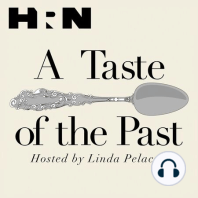37 min listen
Episode 180: The Food History Reader
ratings:
Length:
33 minutes
Released:
Aug 28, 2014
Format:
Podcast episode
Description
Its that time of year again - students are headed back to school! Linda Pelaccio gets in the spirit on a academic themed episode of A Taste of the Past with guest Ken Albala, Professor of History at the University of the Pacific, USA. He is the author or editor of 17 books including Eating Right in the Renaissance, The Banquet and Beans: A History. He has also coauthored two cookbooks, The Lost Art of Real Cooking and The Lost Arts of Hearth and Home. With the proliferation of food history courses and avid interest among scholars and the general public, the need for a solid comprehensive collection of key primary texts about food of the past is urgent. His latest book, The Food History Reader, is that collection. Tune in as he urges researchers to focus on primary sources and gives listeners some insights into the world of food history. This program was brought to you by Fairway Market. I think we need fewer encyclopedias and more original research and it wont happen unless a generation of students is raised on the original sources and not the rehashes of information. [12:00] People eat certain things as expressions of who they are and who they want to be. [16:00] --Ken Albala on A Taste of the Past
Released:
Aug 28, 2014
Format:
Podcast episode
Titles in the series (100)
Episode 1: William Grimes: A History of New York Restaurants: On the pilot episode of A Taste of the Past, Linda Pelaccio takes us on a journey through the history of New York City restaurants, from the big boarding house taverns to the Bijou-style eateries. by A Taste of the Past
